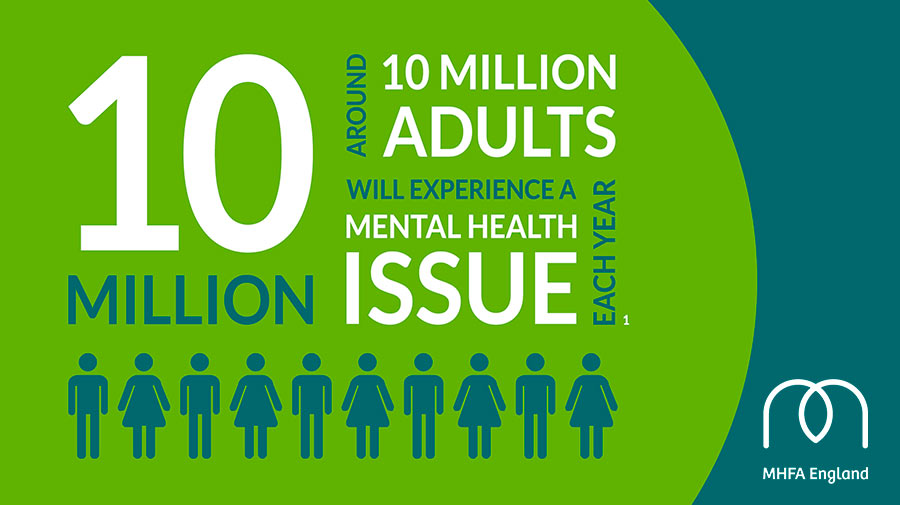I am now part of a community of over 500,000 people in the UK and 3 million people worldwide; I am proud to say I am a certified Mental Health First Aider.
This means I have been trained to recognise mental ill health and help people find the support they need to stay well. In this article, I’ll explain what that means, why it’s so important and what PLS is doing to help our employees.
What is mental health?
1 in 4 people in the UK will suffer from a mental health issue each year. That is a staggering statistic and one we should all take very seriously. What is mental health? We all have mental health, sometimes it’s healthy, sometimes it’s not – just like our physical health. Mental ill health can come in many different forms - again, just like physical ill health. The most common mental health issues in the UK are:
The impact of mental ill health
Due to the prevalence of mental ill health in the UK, everyone is likely to be impacted in some way, at some point. Obviously, the person experiencing the ill health is affected most severely – physically, mentally, emotionally and often financially. The person’s family and close friends are also impacted; helping a loved one through a difficult time can be extremely upsetting and will inevitably disrupt family life, amongst many other things. The impact then ripples to business, the economy and wider society; mental health issues are responsible for 91 million working days lost in the UK.
What is a Mental Health First Aider?
A Mental Health First Aider is someone who has taken the MHFA (Mental Health First Aid) internationally recognised 2-day certified training course. The course is designed so that, on completion, the person is able to:
- Understand the important factors affecting mental ill health
- Identify the signs and symptoms of a range of mental health conditions
- Use MHFA’s official 5-step action plan to provide mental health first aid to someone experiencing a mental health issue or crisis
- Listen non-judgementally and hold supportive conversations using the MHFA action plan
- Signpost people to professional help, recognising that the role as a Mental Health First Aider does not replace the need for ongoing and professional support
- Escalate to the appropriate emergency services, if necessary
- Maintain confidentiality as appropriate
- Protect themselves while performing their role
I did my training through St John’s Ambulance and it was an incredibly valuable and meaningful experience. My trainer was, of course, very knowledgeable, but more importantly warm, reassuring and encouraging. The course covers some very heavy and serious topics; the gravity of mental ill health is felt and respected throughout the course. Not only did I finish the course feeling prepared, but also very appreciative that my employer understands the importance of such training.
Mental Health First Aid in the workplace
As defined by MHFA England, the role of a Mental Health First Aider in the workplace is to be a point of contact for an employee who is experiencing a mental health issue or emotional distress. This interaction could range from having an initial conversation through to supporting the person to get appropriate help. As well as in a crisis, Mental Health First Aiders are valuable in providing early intervention help for someone who may be developing a mental health issue. Mental Health First Aiders are not trained to be therapists or psychiatrists, but they can offer initial support through non-judgemental listening and guidance.
Professional Language Solutions and mental health
Chronic stress is one of the leading causes of mental ill health. It is a fact that teaching is one of the most stressful jobs in the UK. Therefore, as employers of over 500 language teachers, it is Professional Language Solution’s duty to support our teachers wherever possible. Many of our teachers work remotely on a freelance basis, but we are able to reduce stress levels by maintaining and encouraging open and honest communication and dialogue, providing real support from a dedicated Account Manager, making sure payment is made on time, informing teachers of any changes as quickly as possible etc. And of course, as a Mental Health First Aider, the teachers know they can contact me confidentially for any support they might need.
Teachers working on one of our largest contracts work together in a language centre. At this centre we are soon to have a ‘Wellbeing Corner’ where teachers can find information on mental health, read self-help books, share tips on dealing with stress, join yoga and pilates groups or just sit around, eat biscuits and have a chat. We hope this will help to destigmatise mental ill health and let our teachers know that ‘it’s okay not to be okay’!
If you are worried about someone else’s or your own mental health, it’s important you get help. Please follow this link for guidance https://www.mentalhealth.org.uk/your-mental-health/getting-help
About the author:
 |
Anna is a CELTA and Trinity Dip-TESOL qualified English language teacher, with a background in Academic Management. |
References:
https://www.essexlifestyleservice.org.uk/resources/uploads/Role_of_Mental_Health_First_Aider.pdf
https://www.mentalhealth.org.uk/statistics/mental-health-statistics-mental-health-work
https://mhfaengland.org/mhfa-centre/research-and-evaluation/mental-health-statistics/
Adult MHFA Manual. Copyright 2016 MHFA England


